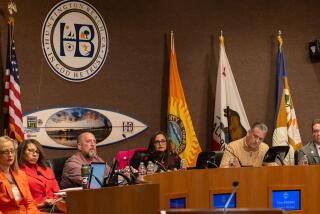Trustees OK Birth Control Program for School Clinic
- Share via
Despite objections that it would promote promiscuity among teen-agers, the Los Angeles school board on Monday voted 6 to 1 to establish a model high school health clinic that will offer birth control information and contraceptives, as well as general medical screening services.
The board also specified that students who seek birth control information and devices at the clinic must obtain “full and informed” parental consent, although it was unresolved whether the school district has the legal right to make the consent mandatory.
Under state law, teen-agers can seek contraceptives without their parents’ permission. Supt. Harry Handler said school district attorneys need additional time to examine the consent issue for the board.
High Rates
Casting the sole vote against the clinic was West San Fernando Valley board member David Armor, who said it will encourage teen-agers to engage in premarital sex and perhaps exacerbate already high rates of pregnancy and sexually transmitted diseases.
In 1984, teen-age girls accounted for 12% of the total births in Los Angeles County, according to Department of Health Services statistics. In addition, among teen-agers, there were 8,840 cases of gonorrhea and 117 cases of syphilis.
“A lot of people are saying it would be better for young people to abstain (from sex), but that they’re going to do it anyway,” Armor said. “Isn’t that like saying, ‘Of course, I’ll tell kids they shouldn’t smoke, but they’re going to smoke anyway. So why not sell cigarettes in the student store?’ . . . They’re being given a double message.”
Armor also argued that although contraceptives have been widely available for more than 20 years, they have not helped to cut down the teen-age pregnancy rate.
Strongly Disagreed
His colleagues, however, most notably the three women board members, strongly disagreed.
“I think it is long past the time--with or without parental consent--to establish this clinic,” board President Rita Walters said.
She cited studies showing that pregnancy and child-rearing seriously impair the quality of life of teen-age girls, causing a disproportionate number of them to drop out of school, become trapped in low-paying jobs or go on welfare.
Board member Roberta Weintraub, who co-sponsored the clinic proposal with Jackie Goldberg, said, “Babies are having babies who are having babies. Somehow or other we have to break the cycle. . . . To know about (a problem) and not do something about it is ethically unresponsible and morally reprehensible.”
Goldberg said she hopes the clinic will open next fall. In the meantime, private funds will be sought to operate the clinic, which would be the first of its kind in Southern California.
Nationwide about 35 school-based health clinics are in operation and another 75 are being planned, officials said. Most of the clinics offer some form of family planning services.
Testifying Monday, Scott McBride, representing the Four Freedoms Coalition, a network of 10 organizations based in the San Fernando Valley, cautioned the board against approving the clinic without considering liability issues that may add “additional financial burdens to the district.” He also cited a study that, he said, showed that birth control programs aimed at teen-agers were not effective in combatting teen-age pregnancy.
Marguerite Byrns, representing Catholic Archbishop Roger Mahony, testified that giving teen-agers access to birth control in a school clinic would “undercut the legitimate interests of the parents” and suggest that school officials condoned teen-age sex.
However, Bishop Oliver Garver of the Episcopal Diocese of Los Angeles spoke in favor of the clinic, urging educators to “enter the battle and defeat the ignorance” that has led to the escalation of teen-age pregnancies.
Informal Survey
Also in favor was Joyce Manley, a teacher at the Harold McAlister High School for teen-age mothers. She said an informal survey she took among 63 pregnant teens this week showed that most started having sex by the age of 14 and that the vast majority did not use contraceptives. Most said they did not use birth control, because they could not afford it or did not know where to get it.
The board also heard from a pregnant teen-ager. Noting that she would have liked to discuss birth control with her mother but could not because her mother would not understand, Annette Careaga urged the board to establish the clinic.
“I’m 16 and I’m going to be a mother also,” Annette said. “I don’t want anyone else to go through what I’m going through now. It’s not that easy.”
Annette said she tried to get birth control but could not afford it. Then, when she got pregnant, she said she was surprised.
“I didn’t think it could happen to me,” she said.
More to Read
Sign up for Essential California
The most important California stories and recommendations in your inbox every morning.
You may occasionally receive promotional content from the Los Angeles Times.














